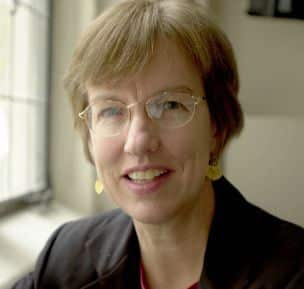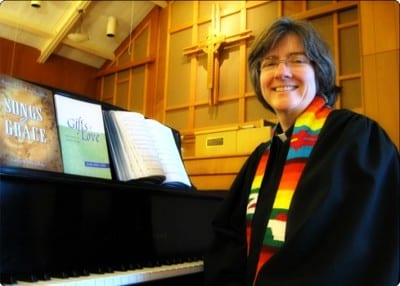Hymnwriter Ruth C. Duck remembered for her trailblazing use of inclusive language
In her 1993 hymn, “Come and Seek the Ways of Wisdom,” the Rev. Dr. Ruth C. Duck personified wisdom as “she who clears the path to justice, showing us what love must do.”
The same can be said of Duck, the internationally renowned hymnwriter who spent her life turning sacred words and ancient liturgies into hundreds of groundbreaking hymns which captured God’s inclusive love and heart for justice.
Duck passed away on December 26, 2024. She was 77 years old.
“She helped people understand how narrow the image of God had been. We all relied on her creativity and powerful imagery,” said the Rev. Dr. Davida Foy Crabtree, a now retired conference minister who belongs to First Church in Windsor, Connecticut.
A liturgical trailblazer
Duck, an ordained pastor in the United Church of Christ who served several congregations before assuming her role as Professor of Worship at Garrett-Evangelical Theological Seminary in Evanston, Illinois, was a liturgical trailblazer.

Her use of feminine language and imagery for God in the early 1970s awakened worshipers of all races and creeds that God can be Mother as well as Father; God can be Womb of Love as well as Creator.
“Ruth was at the very beginning when feminist, womanist, racial and liberation theologies were bursting onto the scene in the early ‘70s,” said the Rev. Loey Powell, who was among the first openly Lesbian pastors to be ordained in the United Church of Christ in 1978. She later served in the UCC national office as executive director for the then Coordinating Center for Women in Church and Society (CCW).
Powell recalls how she and her fellow seminarian students were often dismayed by the “Father” language in hymnals. Duck, she says, was among the “very few” women who started writing hymns from a feminist perspective.
“She had a great impact on us, especially those of us in the LGBTQ community. Ruth’s hymns were very affirming, giving us a new language to relay the love of God to all,” said Powell.
Duck’s “wellspring of creativity,” added Powell, also reached beyond gender. “She brought forth new imagery for the earth as well. Ruth cared for God’s creation so much, too,” she said.
Testimonies amid the worn pages
For Foy Crabtree, she can’t remember a time “when Ruth’s presence — her friendship as well as her inspired liturgy” was not a part of her ministry.
So important was Duck’s work, that when the former conference minister was faced with divesting her massive ministerial library — a daunting task for retiring pastors — Foy Crabtree chose to keep Duck’s books.
Among them was “Bread for the Journey: Resources for Worship” which Foy Crabtree admits is “battered and beaten,” with all the dates written in the margins of when she used Duck’s liturgies.
“I had thousands of books to divest to fit into an apartment, but Ruth’s were ones I could not nor would want to part with. I continue to turn to them,” she said.
Foy Crabtree is not alone in having a dog-eared Duck book as a powerful testimony to the work of the hymnwriter. For Powell it is Duck’s “Everflowing Streams: Songs for Worship” that is treasured.
“It is like a little Bible for me,” said Powell.
Inspiring across denominations
Forty years ago, at the beginning of her pastoral ministry, the Rev. Carolyn Winfrey Gillette, a celebrated hymnwriter ordained in the Presbyterian Church (U.S.A.), discovered two worship resources edited by Duck: “Bread for the Journey” and “Flames of the Spirit: Resources for Worship.”
Gillette, who co-pastors with her spouse, Bruce, the First Presbyterian Union Church in Owego, New York, had been searching for inclusive language worship planning books. The books proved so helpful to Gillette that she added a third Duck resource to her pastor’s library, “Touch Holiness.”
“I used all three of these books so much that they became well-worn, and, after many years, some of the pages began falling out,” said Gillette.

Duck’s work, with hymns “filled with beautiful images … that creatively allude to biblical references,” inspired the Presbyterian pastor’s own hymnody journey. To date, Gillette has written more than 500 hymns. And when contacted by aspiring hymn writers seeking advice, the name Gillette recommends to them for inspiration is “Ruth Duck.”
“I am confident that Ruth’s beautiful, faithful words will be a blessing to the Church for years to come,” said Gillette, who adds on a personal note that the is “happy that Ruth’s middle name is ‘Carolyn.’”
A ‘brilliant poet’ who encouraged others
While in life Duck’s accolades were many, even receiving the North American Academy of Liturgy’s highest honor in 2018, the Berakah Award, her greatest legacy say friends and colleagues is how she never basked in her own glory, but that of the glory of God, always looking for opportunities to spark another’s creativity.
“Ruth was a brilliant poet, but her talent transcended just a brilliancy with words. Ruth was entrenched in scripture. She wrote from her heart, capturing what she saw all around her and what she experienced in the world,” said Powell.
And it is such authenticity that has made her work come alive.
Diane Stephens Hogue, a Presbyterian spiritual director in Castle Pines, Colorado, and former affiliate faculty of Garrett-Evangelical Theological Seminary, credits Duck — a “tender soul” and “fierce writer” — with shaping her own liturgy writing and retreats.
“It just wouldn’t be a ‘Diane Hogue’ retreat without at least one Ruth Duck hymn,” she said.
On a deeper level, Duck’s witness has “encouraged” Hogue in her spiritual direction work, especially when working with people struggling with “confining understandings of God.”
A legacy for generations to come
The Rev. Hannah C. Brown of West Concord Union Church in Concord, Massachusetts, is one such person who struggled to understand God early in her call to ministry. And it was Duck who “had a profound influence” on Brown.
“As a young adult, I was torn between two contrary impulses — an attraction to the Christian tradition, and a dismay in how patriarchal power was represented and reinforced in theology and in liturgy,” said Brown.
While in college, though, she was introduced to the UCC’s New Century Hymnal, in which 14 of Duck’s hymns are featured.
“Witnessing how Christianity was practiced in the UCC and singing Duck’s hymns helped me to trust that there might be room for me and so many others in this ancient tradition,” said Brown.
Brown did more than find room amid traditions, she also discovered her own talent for hymn writing. Her first book of hymns will be published later this year by GIA Publications.
“Even now I continue to learn from Ruth. I am so grateful to have ‘met’ her,” she said.
Foy Crabtree hopes that in death there will be a renewed interest in Ruth Duck’s work with many more like Brown meeting the hymn writer for the first time and, thus, continuing the important work of creating inclusive worship resources.
“Ruth would have been delighted to know that she would have sparked such a renewal. Part of her giftedness was that she had a way of igniting the creativity of others,” said Foy Crabtree, adding, “Our impoverished imaginations were enriched not only by her creative use of words, but by her love of worship and her belief in its power to transform us. Yes, she was a liturgist and a hymnwriter, but most of all, she was a theologian of worship.”
Content on ucc.org is copyrighted by the National Setting of the United Church of Christ and may be only shared according to the guidelines outlined here.
Related News
Who’s Next?
This week the Supreme Court agreed to oral arguments on the challenges to Presidential...
Read MoreGender and Sexuality Justice Ministries joins global movement to end violence against women, children
The Gender and Sexuality Justice Ministries (GSJM) of the United Church of Christ has joined...
Read MoreUCC and United Church of Canada celebrate a decade of ‘shared mission, mutual accountability, common hope in Christ’
Ten years ago, the United Church of Christ (UCC) and The United Church of Canada (UCCan)...
Read More


